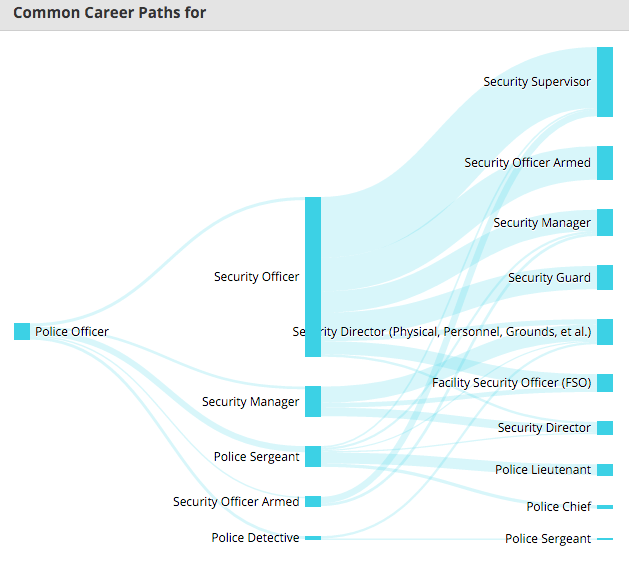Here are some of the ways your police or law enforcement career could benefit if you earn a criminal justice bachelor’s or master’s degree in law enforcement leadership.
Job Security
Going back to school typically requires a large financial commitment as well as a time commitment — two very important factors for anyone considering a law enforcement degree. So it is important that the payoff is worth the investment. When it comes to the law enforcement field, the payoff looks promising especially in the area of job security. A career in law enforcement means job security for three main reasons:
- Crime is an ever-present reality. Besides the domestic public safety threats, international terrorism and drug trafficking are major sources of concern, requiring constant surveillance and policing not to mention additional resources to monitor such vast networks and information.
- Babyboomers in leadership positions are retiring. As baby boomers in leadership positions retire from law enforcement, replacements with leadership skills will be needed.
- In the public police sector it’s not about profit, it’s about protection. As an employee of the public sector you are less likely to get laid off should hard times hit, because in good times or bad, protecting the safety of citizens is always a priority. Unlike the private sector, profit is not the main driver.
According to the Bureau of Labor Statistics, there will be an estimated 36,000 new jobs available for first line supervisors of police and detectives by 2022.
Salaries
Salary for those in law enforcement is dependent on a number of factors including education level, geographic location, position and experience. According to the Bureau of Labor Statistics, the mean annual wage for police and sheriff patrol officers as of 2014 was $59,560. California ranks at the top when it comes to states with the highest employment level and the highest salaries in the occupation.
States with the highest employment level in this occupation:
| State | Employment (1) | Employment per thousand jobs | Location quotient (9) | Hourly mean wage | Annual mean wage (2) |
| California | 68,220 | 4.51 | 0.95 | $42.08 | $87,520 |
| Texas | 55,270 | 4.92 | 1.04 | $25.93 | $53,940 |
| New York | 50,060 | 5.68 | 1.20 | $34.76 | $72,310 |
| Florida | 38,390 | 5.01 | 1.06 | $27.72 | $57,650 |
| Illinois | 31,230 | 5.42 | 1.15 | $32.93 | $68,500 |
Source: BLS, 2014
Top paying States for this occupation:
| State | Employment (1) | Employment per thousand jobs | Location quotient (9) | Hourly mean wage | Annual mean wage (2) |
| New Jersey | 22,200 | 5.74 | 1.21 | $42.56 | $88,530 |
| California | 68,220 | 4.51 | 0.95 | $42.08 | $87,520 |
| Alaska | 1,100 | 3.37 | 0.71 | $36.38 | $75,670 |
| New York | 50,060 | 5.68 | 1.20 | $34.76 | $72,310 |
| Washington | 8,030 | 2.77 | 0.59 | $34.73 | $72,240 |
Source: BLS, 2014
First line supervisors of police and detectives receive a mean annual wage of $84,260 as of 2014, according to BLS study, which has California again ranking as the top paying state in the country for the occupation (with a mean annual wage of $124, 650).
Top paying States for this occupation:
| State | Employment (1) | Employment per thousand jobs | Location quotient (9) | Hourly mean wage | Annual mean wage (2) |
| California | 3,740 | 0.25 | 0.33 | $59.93 | $124,650 |
| New Jersey | 2,730 | 0.71 | 0.94 | $59.79 | $124,360 |
| District of Columbia | 1,100 | 1.63 | 2.18 | $55.78 | $116,010 |
| New York | 12,340 | 1.40 | 1.87 | $50.83 | $105,730 |
| Illinois | 5,180 | 0.90 | 1.20 | $47.90 | $99,630 |
Source: BLS, 2014
Some might argue that while California has the highest salaries in the nation it also has one of the highest costs of living. Yet, that doesn’t seem to be entirely true. When Police Link looked at growth rates, average salaries, and cost of living, California came in number eight, making the list of the top 10 highest paying states for law enforcement (2011). The list included New Jersey, Maryland, California, Illinois, Connecticut, Minnesota, Oregon, Washington, Utah and Colorado.
So Do You Need a Degree?
In order to land a job as a first line supervisor you have to start from somewhere. This graphic shows common career paths or those in the law enforcement field.
Source: PayScale
When it comes to climbing the ladder, law enforcement isn’t too different from every other occupation. But in order to advance from an entry-level cadet or police officer to a detective or sergeant, eventually landing the chief of police position, you need education and experience. While an associate’s degree used to get you far in the field, today the standards are much higher.
According to a bluesheepdog.com article, “To set yourself up against the competition, you definitely want to try to get as much advanced education as possible. Truly, employers within the criminal justice and security fields are looking for employees who can make an impact in their organization. The days of having an associate’s degree to set yourself apart are gone. The era of obtaining a bachelor’s or master’s degree is here.”
An examination of current job postings confirms this. While a master degree is rarely required, it is often preferred for candidates looking to rise to the top. Here are a couple examples of education requirements current employers are looking for in police chief candidates, according to their job postings (source: indeed):
Deputy Police Chief
City of Davis, CA —Davis, CA
$111,945 – $136,070 a year
Equivalent to a Bachelor’s degree from an accredited college or university with major course work in police science and administration, public administration, business administration, political science or a related field. A Master’s degree in public or business administration is preferred.
Value placed on professional development and growth.
Chief of Police
Paine College—Augusta, Georgia
Bachelors or Masters Degree in Criminal Justice or related field with supervisory experience at the Captain or Deputy Chief level or higher in a college or university setting or related field or equivalent combination of education and experience.
Chief of Police
Statesville, North Carolina Police Department
Salary Range: $78,281.22 – $129,163.84
Graduation from an accredited college or university with major course work in law enforcement, public administration or related field with a preference for a masters degree in one of the fields, and extensive experience of a wide and progressively responsible nature in police service including extensive administrative experience; or any equivalent combination of experience and training which provides the required knowledge, skills and abilities.
So, is a degree necessary in the field of law enforcement? The answer is yes if you are looking to advance in the field. While entry-level positions and many police officer roles do not require higher education, if you want to grow your career and move into the more lucrative roles with leadership responsibilities, education is critical.
University of San Diego offers a 100% online Master’s in Law Enforcement and Public Safety Leadership. Tuition for this program is $729/unit. To learn more about this top-rated, accredited program, including additional scholarship and grant information visit our program page or connect with one of our 70 program ambassadors – law enforcement professionals like you who have advanced their careers by enrolling in the program.





